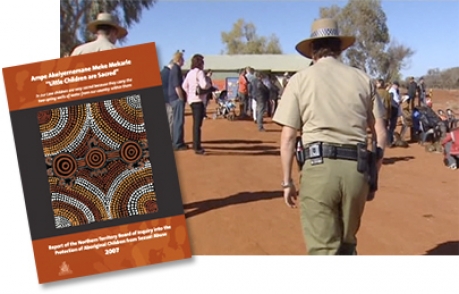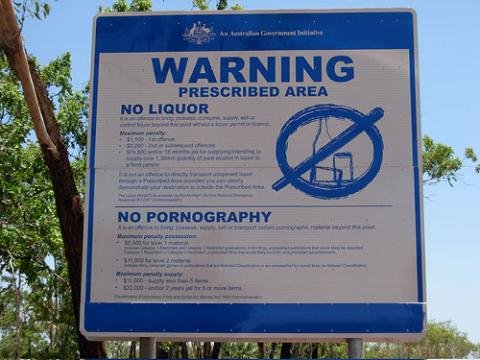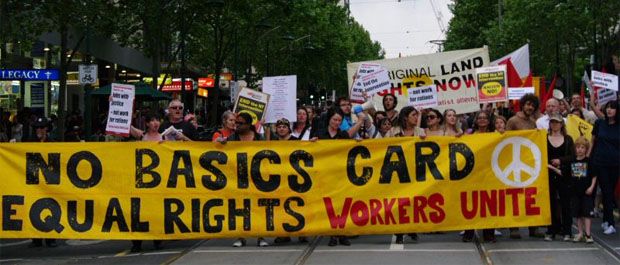Northern Territory Intervention: good or bad thing.
One of the Australia’s controversial policy known as the Northern Territory Intervention also referred as the Northern Territory Emergency Response (NTER). This essay will elaborate what is the Intervention, and it is a bad thing or good thing for Aboriginal lives dwelling in the Northern Territory.

Images Source: here
The NTER aim to protect children from paedophiles, safe and empower Aboriginal community in prescribed areas. The Intervention was announced by the John Howard government on 21st June 2007 with the complete support from the opposition party (labour party). The policy received a strong criticism from the local and international human rights groups. After the Howard government, his successors made the changes to the Intervention to make it more effective. The Intervention is an emergency response to the report ‘Little Children Are Sacred’, which was presented to the Northern Territory Parliament on 16th June 2007. The report delineated continuous social problems faced by the Aboriginal community such as drug and alcohol abuse, gambling, poor education, housing, unemployment, pornography, loss of general identity, and poor health (Little Children Are Too Sacred 2007). But widespread of the child sexual abuse, and family violence in the community brought Australian media, citizens, and politicians attention. Furthermore, the writers found that the predominant reason of these problems is the inability of the past, and the current government to break the cycle of violence and poverty. Moreover, the authors stated the reasons of this crisis, for example, mainly no cooperation and coordination between agencies and government, lack of funding, and resources, poor crisis response and desperately improvement needed in government services (LCATS 2007). Before leaving the office, John Howard introduces Northern Territory National Emergency Response Act 2007. The legislation mainly applied in 73 identified Aboriginal communities in the NT, and four Cape York communities (Coen, Mossman, Aurukun and Hope Vale) for distribution of the income management scheme. The initial range of measures implemented to tackle sexual abuse and violence, such as alcohol restrictions on Aboriginal land, increasing police patrolling, health check for children, linking welfare payments with the school attendance, welfare payments only used for goods and services, not for liquor and cigarettes, prohibiting the possession of porn and audit of public computer for illegal materials. Furthermore, improving housing, clean up, and repair communities, and abolishing the permit system on Aboriginal land, etc. (Northern Territory National Emergency Response Act 2007 No. 129). The government argued the Intervention is the much-needed program. On the other hand, Dr. Lowitja, former ATSIC chairwoman stated that removing the rights of people is not an appropriate way to address sexual child abuse, government can’t come over force the law on people, you must consult to them (The Age 2007). Over the years, The Intervention losing its influence and effectiveness, and became a nightmare for Aboriginal communities.

Images Source: here
The Intervention entered into the second phase with Kevin Rudd as the prime minister. The NTER has already received strong criticism such as If the Intervention is about save Aboriginal children from sexual abuse, then why the word ‘child’ and ‘children’ are not mentioned in the NTER act. Moreover, the word ‘land’ and ‘point’ frequently appeared in the legislation. The one perspective is that child sexual abuse was a ‘Trojan horse’ and some people alleged It is an excuse to regain the control of Aboriginal land and communities (Altman and Hinkson 2010). In 2008, NTER Review Board conducted an independent and transparent regarding about the Intervention. The NTER Review Board (2008) has found that, there is immense anger within the Aboriginal community for being treated as different than other Australians. Furthermore, they have found NTER was received with a sense of disbelief and betrayal. The Review Board key recommendation such as the federal and NT governments need to address the undoubtedly high level of social isolation in prescribed communities. Secondly, re-established their relationship with Aboriginal community based on genuine partnership and consultation. At last, obey the Racial Discrimination Act (RDA), and respect human rights. In response Rudd government, the re-designed some of these measures such as alcohol, and prohibited item restrictions, store licensing, five year leases and limited reinstatement of RDA. Today, the Intervention is replaced by the new legislation known as Stronger Futures policy. The Intervention is good policy for indigenous if it had based on the human right framework. Some of the elements of the policy are not being followed, or ignored such as consultation with Aboriginal leaders and community, suspension of RDA, evidence-based approach and monitoring and evaluation. Firstly, suspension of RDA 1975 in the Northern Territory, and anti-discrimination law in prescribed areas in Queensland, allow to Aboriginals differently compared to their fellow Australians based on their race. Clearly, the Intervention violates articles of the United Nations Declaration on the Rights of Indigenous Peoples regarding education, freedom, self-determination, human rights, cultures and employment etc. (Human Rights n.d.). Secondly, lack of consultation with key shareholders, including Aboriginal leaders, communities and non-governmental organisations. The NTER imposed on the communities with the range of measures such as liquor restrictions, the basis card (which allow recipients only to spend on approved items mainly food and clothing), increasing policing patrolling, compulsory school attendance linking family payments, enforcing health checks for children, and improving reforming housing in NTER communities. In 2009, the government declared number of changes to the Intervention and announced a genuine consultation in the future (NTER Review Board 2010). Thirdly, evidence based approach is key to the any policy successful development. However, the Intervention is based on the report ‘Little are Children are Sacred’ which point to sexual abuse and violence in the community. In fact, in the 2011 NTER Evaluation Report showed 41% residents feel safe, and 32% said a little bit in 16 NTER communities, and abuse cases relating child protection had risen (FaHCSIA 2010). At last, monitoring and evaluation is an important for the policy. In the last 10 years since the Intervention implemented, there was not much done to monitor its effectiveness in the community. In the first year of NTER, no public computer monitored for pornography, school attendance remained same, an increase in substance abuse, and junk food. After the second year, Increase in substance by 77%, domestic abuse by 61%, and substance related crime by 34%. After five years, increased in suicide rates by 500%, Aboriginal incarnation by 40%, Aboriginal children out of home care by 69%, and dropped in school attendance by 62%. After 10 years people in NTER communities are having difficulties to pay at the supermarket and garage sales and the basis card, or trial card has failed in achieving its objectives pretext of control over people’s life choices. Not just NTER communities, but in South Australia’s rural areas where the government introduced trail area had seen increased in crime from robbery, trespass, to serious criminal charges (Creative Spirits n.d.). The Intervention is not successfully improving Aboriginal living conditions, education, employment opportunities etc.

Images Source: here
The government policies in NTER areas are controversial, unlawful, debated. Many people supported the Intervention and explains its effectiveness to the communities such as extra police patrolling, new safe house for children, Indigenous offers to support 16 Government Business Managers who are serving in NTER communities, health checks including dental and hearing for the communities and nutrition programs in the NTER schools. However, the Intervention breaches the Declaration on the Rights Indigenous Peoples for example, article 3.1. Aboriginal peoples have the right to determine and develop priorities or the use of their land and other resources (Human Rights n.d, p.12). In the youth work framework, the Intervention violates many of the youth worker principles which are outlined in the Youth Affairs Council of Victoria in 2007, such as the positive transitions and healthy development of young people, empowerment, participation, social justice, respect for young people’s human dignity and worth, and connectedness to important people such as community and family. Some Aboriginal leader previously supported the policy, they withdrew their support and ingenious defined the Intervention as ‘monster’, ‘degrading’ and ‘humiliating’.
The Intervention policy implemented to the prescribed communities in the Northern Territory, and Queensland on the basis of the report, which was presented to NT. This policy has all the ingredients to successfully to empower and develop Aboriginal lives and communities in the rural areas, but lack of consultation with the Indigenous people, suspension of Racial Discrimination Act, evidence based policy, monitoring evaluation is drawback of the policy. Implementation policy on the communities forcefully is not solution, and government survey showed there is a massive increase in crime, substance abuse, and violence in the NTER communities year by year. The policy clearly violated all the local and international human rights legislation and deprived Aboriginal people from equal opportunity, social justice, respect, human dignity in the society.
Articles Source:
Altman, J & Hinkson, M 2010, Culture crisis anthropology and politics in Aboriginal Australia, University of New South Wales, UNSW Press, Australia.
Creative Spirits
Northern Territory National Emergency Response Revisited: Evaluating New Income Management in the Northern Territory: Final Evaluation Report
United Nations Declaration on the Rights of Indigenous Peoples, Human Rights
Little Children Are Too Sacred 2007
Northern Territory National Emergency Response Revisited: Psychiatry, Psychology and Law, Report of Northern Territory Emergency Response Review
Northern Territory National Emergency Response Act 2007 (No. 129, 2007
Northern Territory National Emergency Response Review Board 2008
The Age 2007, A national emergency: Howard acts
A first steps for the Victorian Youth Sector

Thank you for your support.